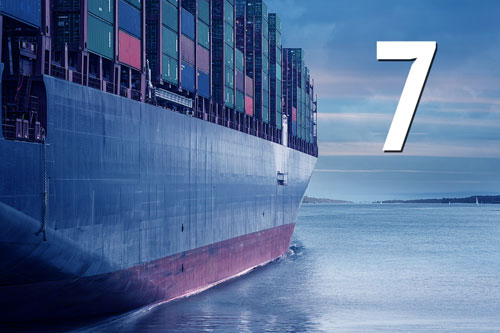
by logisticsplus | Nov 15, 2016 | News
 Here are a few quick, cost-saving tips for importing and exporting from the international air, international ocean, and project cargo freight forwarding experts at Logistics Plus:
Here are a few quick, cost-saving tips for importing and exporting from the international air, international ocean, and project cargo freight forwarding experts at Logistics Plus:
Importing Tips:
- Take the time to confirm your HTS codes before importing. U.S. Customs’ system of classification can be very complicated, and the HTS codes advised by suppliers are not always accurate or match the U.S. classification system 100%. A full cost for imported goods can only be known with the correct HTS codes.
- Keep potential exams in mind when thinking about the transit time, for ocean shipments particularly. An exam can take a week or more, and could be caused by any importer on an LCL consolidation, or a container could be simply selected at random. If goods are time-sensitive, air shipping part or all of the order could save money in the long run.
- Be sure your broker or import forwarder is made aware of all ocean imports well in advance of departure from overseas. An Importer Security Filing (ISF) must be filed timely! Liquidated damages for ISF start at $5,000 for failure to file an ISF, $5,000 for late ISF, $5,000 for inaccurate ISF, $5,000 for an incomplete ISF, and $5,000 for failure to withdraw an ISF. The maximum liquidated damages per ISF filing is $10,000.
Exporting Tips:
- Know your Incoterms®. Incoterms can be a frustrating and confusing to understand; however many exporters do not fully understand the terms to which they are agreeing and, therefore, end up paying more or running into unexpected fees. As an exporter, you need to understand the costs, responsibilities, rights, and obligations that accompany the use of a specific Incoterm. Every quotation or sales order must include a term of sale. If you fail to clearly identify the specific Incoterm to your customer, it can lead to an overestimation or underestimation of the costs associated with the goods you are selling (and a lost sale).
- Research the area to which you are selling. Selling to a new area requires you to keep an open mind. Knowing the market you will be putting your product into can alleviate a lot of the stress with exporting. What currency do they use? What is the local tax or VAT (value-added tax) system? What is the business culture, and/or local culture? When are their holidays or weekends observed?
- Do your paperwork. Know that each country has its own set of importing regulations that require different licenses and customs paperwork. Some countries will require certain stamping, legalizations, or original documents, while others simply accept copies. These vary from country to country, region to region, and with specific commodities.
Most Important Tip:
- Work with an experienced and reputable freight forwarder. An international freight forwarder acts as an agent on your behalf and assists in moving your shipment from its U.S. origin to its foreign destination. Capable freight forwarders are familiar with the import rules and regulations of foreign countries, U.S. import and export regulations, methods of shipping, and required documentation. They can assist you in preparing pricing quotations by providing freight costs, port charges, documentation fees, insurance costs, and handling fees. They can also recommend packaging methods and transportation modes that will best protect your products during transport and ensure they arrive when and where you need them.
Ready to take us up on tip #7? If yes, then click the button below to get started.

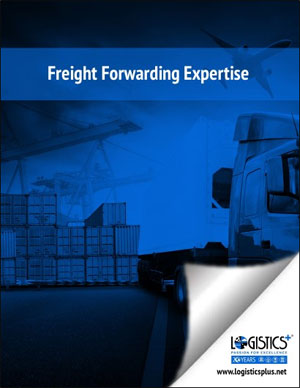
by logisticsplus | Jul 6, 2016 | News
 A freight forwarder, forwarder, or forwarding agent is a person or company that organizes shipments for individuals or corporations to get goods from the manufacturer or producer to a market, customer or final point of distribution. When it comes to international freight forwarding, selecting the right global freight forwarder can help your business succeed by offering relief to many of your supply chain challenges – and possibly even providing you with a competitive advantage. Your freight forwarder should be an experienced and trusted partner for your logistics needs. Increasing levels of global sourcing and omnichannel retailing have created significant opportunities for importers and exporters around the world to optimize their supply chains. Whether you’re with a large, multinational corporation, or a small company shipping globally for the first time, selecting the right global freight forwarding partner can help you save time and money, increase shipment speed and visibility, and reduce your risk.
A freight forwarder, forwarder, or forwarding agent is a person or company that organizes shipments for individuals or corporations to get goods from the manufacturer or producer to a market, customer or final point of distribution. When it comes to international freight forwarding, selecting the right global freight forwarder can help your business succeed by offering relief to many of your supply chain challenges – and possibly even providing you with a competitive advantage. Your freight forwarder should be an experienced and trusted partner for your logistics needs. Increasing levels of global sourcing and omnichannel retailing have created significant opportunities for importers and exporters around the world to optimize their supply chains. Whether you’re with a large, multinational corporation, or a small company shipping globally for the first time, selecting the right global freight forwarding partner can help you save time and money, increase shipment speed and visibility, and reduce your risk.
Here are six (6) questions to ask when choosing a global freight forwarder:
- Can they provide capacity options across multiple shipping modes? They should be able to ship goods by ocean, air, rail or ground, choosing the best option for your need. They should also be able to consult you on consolidation and routing optimization options.
- Do they offer customs brokerage and trade compliance advice? They should be able to leverage customs information and programs to your advantage. They must be knowledgeable in free trade agreements and know how to navigate each country’s compliance requirements, customs rules, governmental regulations, and duty rates.
- Do they have regional offices in key geographic regions? Your global freight forwarder should have deep knowledge of the local countries in which you are importing or exporting. They should be familiar with local languages, infrastructure, economy, currencies, tax laws, and tariffs. They should also be members of reputable freight forwarding networks, such as WCA, IFLN, or TWIG. If a freight forwarder is a member of a reputable network, the chances of them handling your shipment with care and diligence anywhere in the world is higher than if they were not a member. It also shows they have financial strength because there are only a handful of legitimate, quality freight forwarding networks that really vets their members.
- Is their TMS or cargo management systems truly global? There should be one system architecture that works across all regions of the world and covers all types of transportation. Shipment tracking and visibility should be accessible online or, if needed, it should be something you can integrate it into your back office systems.
- Can they help assess and reduce cargo risk? They must adequately assess and mitigate cargo risk to help your company protect its bottom line. They should have adequate cargo insurance and they should be able to issue added insurance policies for your shipments in case of theft, damage, or loss.
- Do they have the experience you need? There are many modes of transport, commodities, regulations, and industries. Your freight forwarder should be able to demonstrate experience handling important freight forwarding shipments for other reputable companies, or those in similar industries.
If you’re looking for a new global freight forwarding partner, you might consider asking these six questions as part of your screening process. We’d be honored if you’d consider Logistics Plus as a potential candidate to be your global partner. Please ask us these same six questions and we’re confident you’ll be satisfied with our answers. Click the first button below to contact us today for more information, or click the second button below to request an international freight quote. You can also click the image shown above to view or download a PDF copy of our Freight Forwarding Expertise brochure.


by logisticsplus | Jun 14, 2016 | News
FOR IMMEDIATE RELEASE
Amazon Selects Logistics Plus for its Solutions Provider Network
Provides retailers with third-party service options for international shipping.
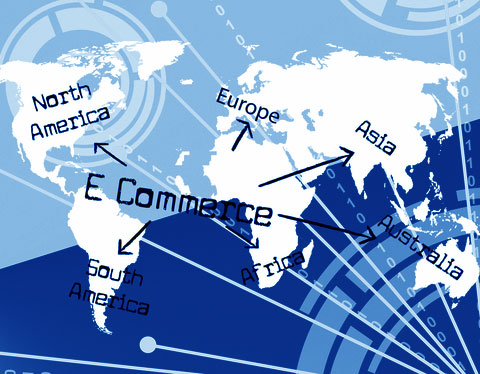 ERIE, PA (June 14, 2016) – Logistics Plus Inc., a worldwide provider of transportation, logistics, and supply chain solutions, announced today that it has been selected by Amazon to be a part of its Solutions Provider Network (SPN) as part of the Amazon Global Selling program. This program provides the tools and support Amazon sellers and retailers need to grow internationally while taking much of the complexity, cost, and effort out of global selling activities.
ERIE, PA (June 14, 2016) – Logistics Plus Inc., a worldwide provider of transportation, logistics, and supply chain solutions, announced today that it has been selected by Amazon to be a part of its Solutions Provider Network (SPN) as part of the Amazon Global Selling program. This program provides the tools and support Amazon sellers and retailers need to grow internationally while taking much of the complexity, cost, and effort out of global selling activities.
Logistics Plus is currently listed as a service provider for FBA international shipping and self-fulfilled international shipping on Amazon’s SPN website. FBA (Fulfillment By Amazon) international shipping is for retailers that need to ship inventory to an Amazon fulfillment center outside of their home country. Self-fulfilled international shipping is for retailers that need to ship the product directly to an international customer.
With over a dozen U.S. locations, and additional offices in countries all around the world, Logistics Plus has been providing international shipping services for the past 20 years. Its international capabilities include imports and exports, air and ocean freight forwarding, project cargo, customs brokerage, global trade compliance, warehousing, and more. For imports, its remote location filing (RLF) status allows it to quickly clear shipments at any and all ports in the United States.
“We are very excited to be included in Amazon’s Solutions Provider Network,” said Jim Berlin, founder, and CEO of Logistics Plus. “Amazon provides many services to its seller community to help them successfully sell their products around the world. Sometimes those services are best covered by a third-party provider. In those cases, Logistics Plus is ready to help with international shipping, warehousing, inventory management, kitting and labeling, released fulfillment to FBAs or direct-to-customers, translation services, and much more.”
Please visit www.logisticsplus.com/Amazon to learn more or email amazonretailer@logisticsplus.com to learn more about Logistics Plus solutions for retailers.
About Logistics Plus Inc.
Logistics Plus provides freight transportation, warehousing, global logistics, and supply chain management solutions through a worldwide network of talented and caring professionals. Founded in Erie, PA by local entrepreneur, Jim Berlin, 20 years ago, Logistics Plus is a fast-growing and award-winning transportation and logistics company. With a strong passion for excellence, its 380+ employees put the “Plus” in logistics by doing the big things properly, and the countless little things, that together ensure complete customer satisfaction and success.
The Logistics Plus® network includes offices located in Erie, PA; Alma, AR; Little Rock, AR; Los Angeles, CA; Riverside, CA; San Francisco, CA; Visalia, CA; Atlanta, GA; Chicago, IL; Detroit, MI; Kansas City, MO; Charlotte, NC; Lexington, NC; Buffalo, NY; Cleveland, OH; Charleston, SC; Greenville, SC; Nashville, TN; Dallas, TX; Fort Worth, TX; Houston, TX; Laredo, TX; Bahrain; Belgium; Canada; Chile; China; Colombia; Egypt; France; Germany; India; Indonesia; Kazakhstan; Libya; Mexico; Poland; Saudi Arabia; Turkey; and UAE; with additional agents around the world. For more information, visit www.logisticsplus.com or follow @LogisticsPlus on Twitter.
Media Contact:
Scott G. Frederick
Vice President, Marketing
Logistics Plus Inc.
(814) 240-6881
Click the image below to download the Logistics Plus logo:


by logisticsplus | Mar 10, 2016 | News
 Import and export financing is much different, for example, than commercial lending, mortgage lending or insurance. There is a longer order-to-delivery cycle on products that are sold and shipped overseas, therefore, it takes longer to get paid. Extra time and energy are required to make sure that buyers are reliable and creditworthy. Careful financial management can mean the difference between profit and loss on each transaction.
Import and export financing is much different, for example, than commercial lending, mortgage lending or insurance. There is a longer order-to-delivery cycle on products that are sold and shipped overseas, therefore, it takes longer to get paid. Extra time and energy are required to make sure that buyers are reliable and creditworthy. Careful financial management can mean the difference between profit and loss on each transaction.
All sellers want to get paid as quickly as possible, while buyers usually prefer to delay payment, at least until they have received and resold the goods. This is true in domestic as well as international markets. Increasing globalization has created intense competition for imports and exports. Importers and exporters are looking for any competitive advantage that would help them to increase their sales. Flexible payment terms has become a fundamental part of any sales package.
- Selling on open account, which may be best from a sales standpoint, places all of the risk with the seller. The seller ships and turns over title of the product on a promise to pay from the buyer.
- Cash-in-advance terms place all of the risk with the buyer as they send payment on a commitment that the product will be shipped on time and it will work as promised.
To address these trade financing risks, there are two broad categories of trade finance:
- Pre-shipment financing to produce or purchase the material and labor necessary to fulfill the sales order.
- Post-shipment financing to generate immediate cash while offering payment terms to buyers.
Here are some additional thoughts to consider:
Financing can make the sale. Favorable payment terms make a product more competitive. If the competition offers better terms and has a similar product, a sale can be lost. In other cases, the exporter may need financing to produce the goods or to finance other aspects of a sale, such as promotion and selling costs, engineering modifications and shipping costs. Various financing sources are available to exporters, depending on the specifics of the transaction and the exporter’s overall financing needs.
Financing costs will vary. The costs of borrowing, including interest rates, insurance and fees will vary. The total cost and its effect on the price of the product and profit from the transaction should be well understood before a pro forma invoice is submitted to the buyer.
Financing costs increase with the length of terms. Different methods of financing are available for short, medium, and long terms. Exporters need to be fully aware of financing limitations so that they secure the right solution with the most favorable terms for seller and buyer.
The greater the risks, the greater the cost. The creditworthiness of the buyer directly affects the probability of payment to an exporter, but it is not the only factor of concern to a potential lender. The political and economic stability of the buyer’s country are taken into consideration.
So where can you turn for import and export financing solutions that help address these concerns?
Logistics Plus (LP), in strategic partnership with WorldBusiness Capital Inc. (WBC), provides a complete, logistics and financing solution for both U.S. and foreign companies. WBC is a commercial finance company that offers flexible term loans helping small and midsize businesses compete in the global marketplace. Our motto is “financing business across borders,” and the programs available include all of the following:
- Emerging Market Projects. Term loans for businesses and projects throughout Latin America, Asia, E. Europe, and Africa.
- U.S. Equipment Exports. Term loans for overseas buyers of new U.S.-made equipment, technology, and services.
- U.S. Trade Capacity Expansion. Term loans for U.S.-based commercial and industrial projects boosting trade competitiveness.
- Foreign Investment in U.S. Term loans for acquisitions, operations, joint ventures, and distribution in the U.S.
- Foreign Sales to U.S. Term loans for U.S. purchases of new foreign-made equipment, technology, and services – with specialized solutions for India-U.S., Mexico-U.S., and Turkey-U.S. transactions.
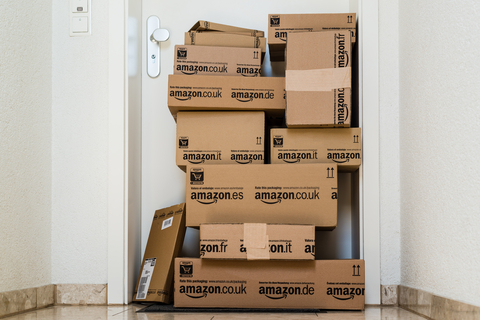
by logisticsplus | Jan 21, 2016 | News
 Logistics Plus is experienced at helping Amazon sellers with importing solutions. We have been recommended by Michael D. Marani, in his book The Amazon Sales Formula (available in e-book format on Amazon.com). Our name also comes up frequently on social media sites and message boards (like the one hosted by Amazing.com – another great resource for retailers). You can also check out these recent articles:
Logistics Plus is experienced at helping Amazon sellers with importing solutions. We have been recommended by Michael D. Marani, in his book The Amazon Sales Formula (available in e-book format on Amazon.com). Our name also comes up frequently on social media sites and message boards (like the one hosted by Amazing.com – another great resource for retailers). You can also check out these recent articles:
Let us know if your business requires any of the following services:
- Ex-Works Import (from your supplier to Amazon door)
- Free-On-Board (FOB) imports
- Customs Clearance for shipper routed freight
- Domestic warehouse & trucking services from any U.S. port
- Port-to-Warehouse transportation
- Basic quality inspection of packaging and card condition
- Extensive quality inspection of the product
- Re-packaging services
- FBA labeling services
- UPS prepaid freight labeling
- Distribution and fulfillment services (pick, pack, ship)
- Product recovery and return services
- Less-than-truckload (LTL) and full truckload (FTL) solutions for best available rates
To help you get started, here are a couple of additional resources you can download:
Amazon Importing FAQs (click image on left) and Amazon Importing Quote Checklist (click image on right)
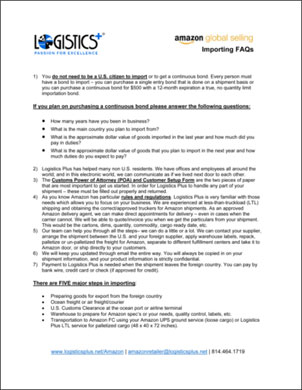
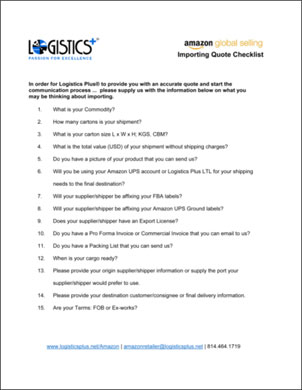
If you’re ready to give us a try, click the button below to request a no-obligation quote on your next shipment. Provide what information you can and we’ll help you with the rest! If you have any questions, feel free to email us at amazonretailer@logisticsplus.com to reach our dedicated Amazon seller support team.


 Here are a few quick, cost-saving tips for importing and exporting from the international air, international ocean, and project cargo freight forwarding experts at Logistics Plus:
Here are a few quick, cost-saving tips for importing and exporting from the international air, international ocean, and project cargo freight forwarding experts at Logistics Plus:




 ERIE, PA (June 14, 2016) – Logistics Plus Inc., a worldwide provider of transportation, logistics, and supply chain solutions, announced today that it has been selected by Amazon to be a part of its Solutions Provider Network (SPN) as part of the Amazon Global Selling program. This program provides the tools and support Amazon sellers and retailers need to grow internationally while taking much of the complexity, cost, and effort out of global selling activities.
ERIE, PA (June 14, 2016) – Logistics Plus Inc., a worldwide provider of transportation, logistics, and supply chain solutions, announced today that it has been selected by Amazon to be a part of its Solutions Provider Network (SPN) as part of the Amazon Global Selling program. This program provides the tools and support Amazon sellers and retailers need to grow internationally while taking much of the complexity, cost, and effort out of global selling activities.




